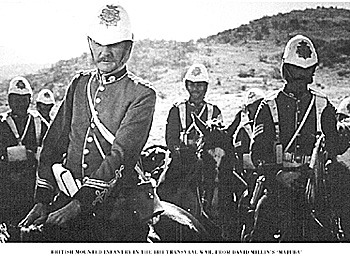 Given that some of the first documentary newsreel footage ever
filmed featured troops departing from Britain for the Anglo-Boer War,
and in the field in South Africa, it is curious that this, undoubtedly the
largest of Queen Victoria's Colonial campaigns, has received very little
attention from movie makers ever since.
Given that some of the first documentary newsreel footage ever
filmed featured troops departing from Britain for the Anglo-Boer War,
and in the field in South Africa, it is curious that this, undoubtedly the
largest of Queen Victoria's Colonial campaigns, has received very little
attention from movie makers ever since.
British Mounted Infantry 1881 Transvaal War, from David Millin's 'Majuba.'
No doubt this is partly due to the popular perception of the war as a very unglamorous one; it was fought by a drably dressed Imperial army in pursuit of a dubious cause and waged against armed civilians, equally drab in appearance, and who ultimately had to be defeated by burning their homes and rounding up their women and children.
There are no opportunities for grand cinematic charges by exotic- looking tribesmen here; indeed, it is probably no coincidence that by far the best film made on a Boer War theme was one which used it as an analogy for the moral wasteland of more contemporary warfare.
The first dramas set in the Boer War grew out of the documentary movement; they were short silent films which tried to pass themselves as newsreel footage, but which were actually acted melodramas, usually with a strong patriotic content, filmed in such exotic locations as Hove, in Sussex. Early in the twentieth century, the South African film industry produced a number of large-scale historical dramas, chiefly 'De Voortrekkers' in 1916 and 'Symbol of Sacrifice' - set in the Zulu War - in 1917.
Although the Voortrekkers were a popular choice of subject - the period of the Great Trek fulfilled the same role amongst Afrikaners as the pioneer period did in America - with a succession of films being made right up to the 1960s, these did not feature early clasbes between the Boers and the British. Thus the British campaigns to limit Trekker ambitions - the fights at Zwartkopjes, Boomplats and Port Natal - have never yet been touched upon. Instead, such films concentrate on the hardships faced by the Trekkers, and their conflict with the Zulus, since the massacre of the Boer leader Piet Retief in 1838, and the subsequent victory at Blood River, have become very much a part of the mythology of Afrikaner nationalism. Also, because of the bitterness engendered by the war itself, the conflict has remained the a touchy subject between English and Afrikaans-speaking South Africans, even to this day.
This reluctance to pick and fresh wounds was most apparent in the 1930s, when three films tackled themes which should by rights have included the Boer War. One of these, 'Rhodes of Africa', was a British film which presented the great empire-builder in a positive light, made as it was in the twilight years of Imperialism; it concentrated almost entirely on Rhodes' adventures in the diamond mines and his dealings with the Ndebele, however, and reduced his complicity in the Jameson Raid to a rather unfortunate footnote at the end of his career. Similarly, 'They Built A Nation', a South African venture which was effectively a motion-picture pageant designed to celebrate the centenary of the Great Trek, presented a series of images of European settlement across the centuries, but
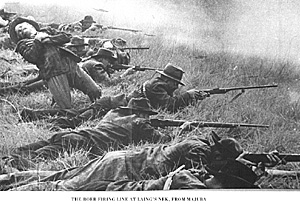
The Boer Firing Line at Laing's Nek, from 'Majuba.' skirted such unfortunate issues as the independent history (if the black South Africans and the clashes between the two white groups.
Interestingly enough, the only film from this period which did tackle the subject head-on was a German production, 'Ohm Kruger', a Nazi propaganda piece which sought to vilify the British treatment of Boer non-combatants, and in particular deflect criticism of Germany's own concentration camp policy by dwelling on the British use of such camps in South Africa.
To date, only one film has been made about the 1881 Transvaal War. It was filmed in 1968 by South African director David Millin, who made a series of epic historical pictures - including one on the Voortrekkers - at a time when epics were enjoying their golden twilight internationally. Called simply 'Majuba', the film was based on Stuart Cloete's novel 'The Hill of Doves'. It was basically an adventure story, a tale of two lovers set against a background of the dramatic events of the Transvaal revolt - and it apparently included scenes from no less than three battles of the period, Bronkhorst Spruit, Laing's Nek and Majuba, all of course British defeats.
I say apparently, since despite having been made comparatively recently, it seems almost impossible to get hold of a copy, and the only surviving print in South Africa is an Afrikaanslanguage version with an orange stain throughout! However, clips have been used on a number of South African TV documentaries, and these suggest that it was entertaining and dramatic, perhaps a little stagy, but with a reasonable level (of historical accuracy.
The battle scenes were filmed near tile real Majuba, with Nkwelo - the, next mountain in the chain, a few miles from Majuba itself - standing in for the real thing. In that regard it is completely convincing, and the scenes of fighting on the mountain, with the Boers storming up the sides and overrunning the crest, were very impressive. Similarly, the attempts to save the Colours of the 58th formed the dramatic focus for the representation of Laing's Nek and were very good, despite a few anomalies (60th Rifles present on occasions when they shouldn't have been, and so on). There are apparently attempts under way to try to trace an appropriate copy of the film and make it available on video, and anyone interested in the period should find it well worth the wait.
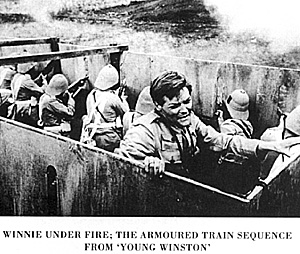 The 2nd Boer War - the Great Boer War or Second War of
Freedom, according to your point of view - first cropped up in recent
times in 1972 in Richard Attenborough's 'Young Winston'.
The 2nd Boer War - the Great Boer War or Second War of
Freedom, according to your point of view - first cropped up in recent
times in 1972 in Richard Attenborough's 'Young Winston'.
Winnie under fire: The armoured train sequence from 'Young Winston.'
This is an episodic bio-pic of the great man's early (lays, which avoided the more controversial aspects of his career and ended with his election to parliament. A good deal of it is preoccupied with his relationship with his parents and his school-days, but it does include three incidents from his military career. Although these work well-enough as examples of Winston's adventures, they are almost all unsatisfactory in other ways, if only because of the film's episodic nature robs the battle scenes of any form of context. The Boer War sequence is the most satisfying of the three, but even then it is introduced with a cursory comment from a narrator that, 'having failed in his first attempt to be elected to Parliament, Mr Churchill went out as a war correspondent to South Africa to witness something of the war against the Boers'.
With no more background than this we are pitched straight into the armoured train incident at Chievely in 1899, when Louis Botha, raiding ahead of the Boer forces invading Natal, knocked the train off its tracks and captured a good few of its escort, Winnie included.
This is actually quite a gripping sequence, with a strong performance by Simon Ward as Churchill, and some good shots of the train. Nevertheless, it is not entirely convincing, party because it was shot in Wales which, although it stands in quite well for South Africa in the close-up sequences, looks far too civilised when quaint cottages and fields are visible in the long shots.
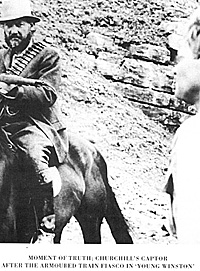 Moment of Truth: Churchill's captor after the Armoured train fiasco from 'Young Winston.'
Moment of Truth: Churchill's captor after the Armoured train fiasco from 'Young Winston.'
It is, in any case, far too hilly for the open country where the actual incident took place, and the Boers, although they look good, behave in a decidedly unBoer-like fashion, lining the skyline and skirmishing conspicuously in the open. Presumably a concealed enemy firing smokeless powder was considered too unphotogenic! At the end of the sequence, Winnie is captured, and the film follows his adventures as he escapes from Pretoria. Again, this is entertaining, although some quite seriously naff South African accents mar the sense of place, and the whole South African episode ends before Churchill returned to the front. Thus we are deprived of a chance to see his involvement in the Spioenkop debacle, which seems so far never to have been tackled in a feature film.
Torn Allegiance
In 1984, the latter stages of the war were the subject of a South African film, 'Torn Allegiance'. A comparatively low budget affair, this benefited immeasurably from being filmed in the right country, but is a rather simplistic tale revolving around the dilemma of a young British officer ordered to destroy the farmhouse of a Boer family for whom he holds a good deal of sympathy. This might have been a good opportunity to explore the ambivalent morality of duty, and indeed the film raises one or two interesting issues, but seems so unaware of them that it leads to a curious moral vacuum at its heart.
These are no doubt due to its origins, and reflect something of the Boer viewpoint; on the one hand the policy of rounding up Boer women and children and destroying their homes is shown to be utterly barbarous, yet on the other the women in question are shown to be supporting their men-folk who are still in the field without any sense of ambiguity. That the one action provoked the reaction, however harsh, is not addressed by the film. Indeed, 'Torn Allegiance' is always at its best when dealing with the Boers themselves; there is a particularly good scene when several 'bitter-ender' commandos, each now reduced to a handful of men, meet to plan an attack on the British camp during a thunderstorm the night before.
One Commandant complains that his men have no cartridges left, and refuses to join the attack; the others decide that, since they have three or four cartridges each, they will try - a conversation with a distinct ring of historical truth about it. The attack, when it comes, is little more than a skirmish, but is well handled, and the scene where two burghers carry off a wounded comrade under fire, muttering prayers as bullets and shells fall all around them, is both gripping and moving. On the down side, the film is marred by a rather hysterical performance by Jonathan Morris (Adrian from 'Bread') as the young British officer, who spends most of his time running around and shouting a lot.
Breaker Morant
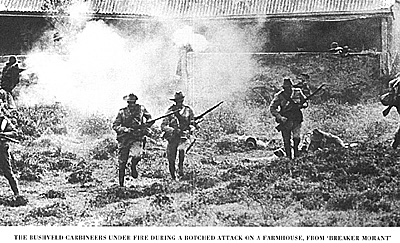 Bushveld Carabineers under fire duringa botched attack on a farmhouse, from 'Breaker Morant.'
Bushveld Carabineers under fire duringa botched attack on a farmhouse, from 'Breaker Morant.'
By far and away the best film yet made on a Boer War theme, however, is the 1979 Australian film, 'Breaker Morant'. This was based on a true story; Lieutenant Harry 'Breaker' Morant was a British ex-pat who had emigrated to Australia, and volunteered to serve in South Africa with an Australian unit, the Bushveld Carbineers.
Towards the end of the war, the Carbineers were operating in the northern Transvaal, and were particularly vigorous in implementing Kitchener's order that Boers taken in captured British khaki uniforms should be summarily executed.
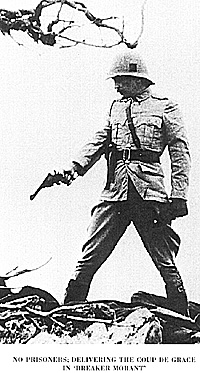
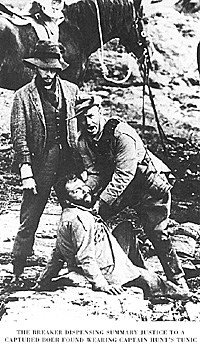 Right: Breaker dispensing summary justice to a captured Boer found wearing Captain Hunt's tunic, from 'Breaker Morant.'
Right: Breaker dispensing summary justice to a captured Boer found wearing Captain Hunt's tunic, from 'Breaker Morant.'
Left: No prisoners; delivering the coup de grace, from 'Breaker Morant.'
Indeed, the film opens with a bungled attack on a farm-house, where Morant's friend, Captain Hunt played by Terence Donovan, Jason's dad and Doug Willis in 'Neighbours'! - is not only killed but mutilated by the victorious Boers. A vengeful Morant leads the Carbineers in hot pursuit; the Boers are attacked, and a man wearing Hunt's uniform is captured, then shot by a firing squad. This is the first of several incidents in which Boers are captured and executed, and which culminate in the mysterious murder of a German missionary, suspected of passing information on to the commandos.
However, so the film argues, peace in nearly at hand, and Britain is anxious to placate the foreign powers, and Kitchener disowns the 'no prisoners' order. Morant and two of his fellow officers, Handcock and Whitton are arrested, tried and found guilty of murder. Whitton's sentence is commuted, but Morant and Handcock are shot by a firing squad. They are, in the title of the book the real Whitton wrote about his experiences, 'scapegoats of empire'.
'Breaker Morant' is a mature and adult film, with a good deal to say about the way in which conventional peace-time morality is increasingly eroded by prolonged conflict. It paints a vivid picture of the way the war was waged a long way from civilisation and civilised constraints, and suggests obvious parallels with the war in Vietnam. In its treatment of the absurdity of charging a man with murder in war- time, it echoes the sentiments of Coppola's 'Apocalypse Now'.
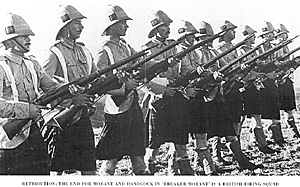 Retribution; the British firing squad marks the end for Morant and Handcock, from 'Breaker Morant.'
Retribution; the British firing squad marks the end for Morant and Handcock, from 'Breaker Morant.'
'Breaker Morant' is no hallucinogenic nightmare head-trip, however, but a gritty and real portrayal in which the Australian locations stand in superbly for the real South Africa. The veld is an empty and windswept landscape of the soul; executed men are given the coup de grace under the withered branches of a (lead tree, and the missionary dies in solitary long-shot.
The costumes and uniforms are excellent, and the film displays that fine sense of the turn of the century, viewed through the soft glow of lamplight, which has characterised a number of excellent Australian films. The performances are universally excellent, especially Edward Woodward - who, incidentally, was up there with Winnie in the armoured train sequence in 'Young Winston' - as Morant, Bryan Brown as the irreverent Handcock, and Jack Thompson as the small-town lawyer turned soldier who defends them at their court-martial.
However, having said all that, there is another side to 'Breaker Morant^. Although the film is honest enough to suggest the complexity of its subject matter - we are left in no doubt that Handcock did kill the missionary - it is a fairly explicit exercise in Australian nationalism, which trades heavily on the mistreatment of the brash young Colonies by the stuffy, devious, and pompous Poms. In that respect it is similar to Peter Weir's 'Gallipoli' in portraying the betrayal of a generation of young Australian's by the cynical mother country; as in 'Gallipoli' it is the British who are the real villains of the piece rather than the Turks, so it is in 'Breaker Morant'.
In 'Gallipoli' the Australian troops are sent in wave after wave in attacks that senior British officers know to be hopeless, whilst in 'Breaker Morant' Kitchener is happy to sacrifice colonials to apologise for policies which he originated. This is a decidedly limited point of view, and if 'Breaker Morant' is an example of a cinematic search for a sense of national identity, it's sense of outrage, sits less well with the historical content. Morant himself had always been an unlikely candidate for the role of hero, and the sense of outrage his case provoked was somewhat dispelled when, in the aftermath of the film's release, it became increasingly clear that not only was he guilty of the murders for which he was tried, but also of a number of other highly dubious acts.
Nevertheless, 'Breaker Morant' deserves to be seen not merely by everyone with an interest in the Boer War, but also as a comment on colonialism - both deliberate and un-intended and on the universal experience of war. Any future films on the Anglo-Boer War will have to go a long way to beat it.
Video Availability
Inevitably, neither the early short silent films set in the Boer War, nor the epics of the 1930s, are readily available on video, although clips from them do turn up occasionally on TV documentaries, both about the history of film and of South Africa. As already mentioned, a question mark hangs over 'Majuba', but rest assured readers of Colonial Conquest will be amongst the first to know if it does see the light of day! There is no problem, however, with the more modern films; according to 'Elliot's Guide To Films on Video, 'Young Winston is available from The Video Collection, 'Torn Allegiance' from Medusa Communications Ltd, and 'Breaker Morant' from a number of distributors, including Guild Home Video and Braveworld Video.
Back to Colonial Conquest Issue 10 Table of Contents
Back to Colonial Conquest List of Issues
Back to MagWeb Master List of Magazines
© Copyright 1995 by Partizan Press.
This article appears in MagWeb (Magazine Web) on the Internet World Wide Web.
Other military history articles and gaming articles are available at http://www.magweb.com